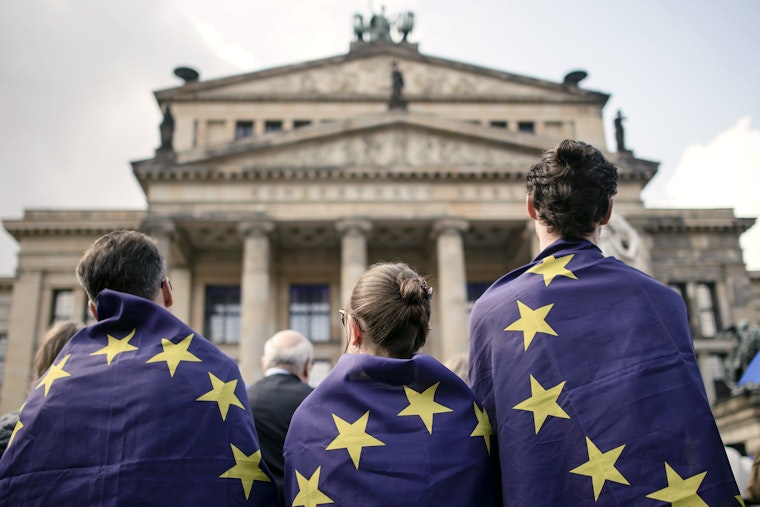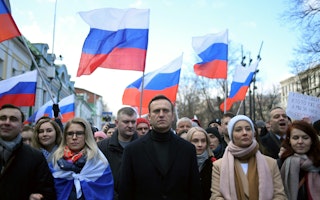Facing Europe’s Crisis of Alienation and Mistrust
By Andrej Nosko

Recently, British Prime Minister Theresa May invoked Article 50, officially triggering the negotiation process for the United Kingdom to withdraw from the European Union. The political earthquake of Brexit is just one of the challenges Europe must now confront.
Europe faces an entangled set of precarious problems, including slow and uneven socioeconomic recovery, increasing migration, and geopolitical security challenges. These problems, along with other rapid social and economic changes to our societies, have sparked a more pervasive and unsettling crisis—a crisis of mistrust, marked by deep feelings of insecurity, anxiety, and suspicion.
Over the last decade, many Europeans have lost faith in their institutions, their politicians, their sources of knowledge, and above all, in each other. A widespread sense of precariousness and pessimism has swept through the European Union. Many voters no longer trust politicians and political institutions.
A 2016 study by Demos [PDF], for example, found “strikingly low levels of trust” in both national and EU institutions, with over half those surveyed in Britain, France, Germany, and Spain reporting low levels of trust in the European Commission—as well as their own national governments. A consequence of this unease has been a surge of support for populist and nationalist movements, and a backlash against European institutions.
The crisis of mistrust is not limited to governments, however. We also see increasing numbers of Europeans rejecting scientific knowledge: the resurgence of diseases like measles and whooping cough (pertussis)—including an ongoing outbreak of measles in Italy, Romania, and several other European countries—has been linked to the spread of anti-vaccine sentiments. Like many of the problems we now face, this public health crisis is self-imposed and completely avoidable—an epidemic of disease spread through an epidemic of mistrust.
Mistrust is fueled by fear, and the resurgent politics of fear have diminished Europeans’ trust in one another further still. Fear makes people seek scapegoats, others whom they can blame for their problems and anxieties. This inclination targets the most vulnerable people in society: minorities and marginalized groups, such as Muslims, Roma, refugees, and LGBT people. False rumors about migrants and refugees have become so common in Germany, for example, that one citizen created a hoax map to track them.
Fear also leads people to look for simple explanations and easy solutions. Instead of looking for evidence-based policies to address their problems and working together to pursue them, they become prone to conspiracy theories. Like the search for scapegoats, by turning to conspiracy theories, people deny their own responsibility and agency—and obscure the real solutions to the problems that they face.
European societies are in dire need of new solutions. But in order to inspire and lead Europe through these crises, leaders who could implement solutions need to have the legitimacy conferred by the trust of their citizens. The lack of civil society voices in policy debates has contributed to the crisis of faith in Europe’s political institutions—and fueled the perception that national governments and the European Union are not accountable to their citizens.
Too often, EU policymakers who want to discuss and solve these problems repeat the mistake of only talking to the same people in the same venues. These high-level policy conversations are strikingly lacking in diversity—not just in terms of race and gender, but also class, geography, professional or educational background, and politics.
There is a critical need to create more inclusive spaces for discussion and debate, and find ways to bring policymakers closer to the everyday experiences of European citizens—from majorities and minorities alike. To that end, the Open Society Initiative for Europe is working to bring unheard voices into these settings—whether by inviting civil society activists to high-level conferences like the Globsec Tatra Summit so they can engage personally with government ministers and senior bureaucrats, or helping support projects like Debating Europe, which allows people to create online debates on the topics that are important to them and then question participating European leaders about these issues.
If we can create avenues for sharing the concerns and perspectives that elites have too easily overlooked, we can begin to build understanding between the policy elite and the grassroots. Having these difficult discussions is the first step to rebuilding the trust Europe needs to face the future.
Until August 2018, Andrej Nosko managed the Governance and Policy Debates Unit at the Open Society Initiative for Europe.


